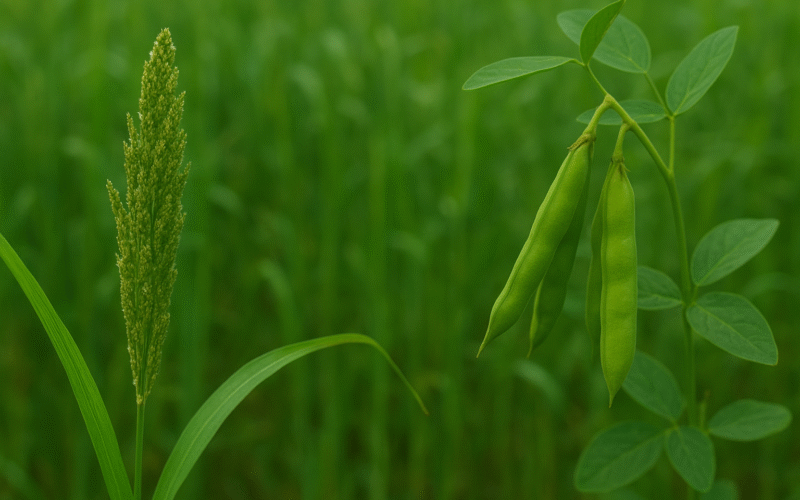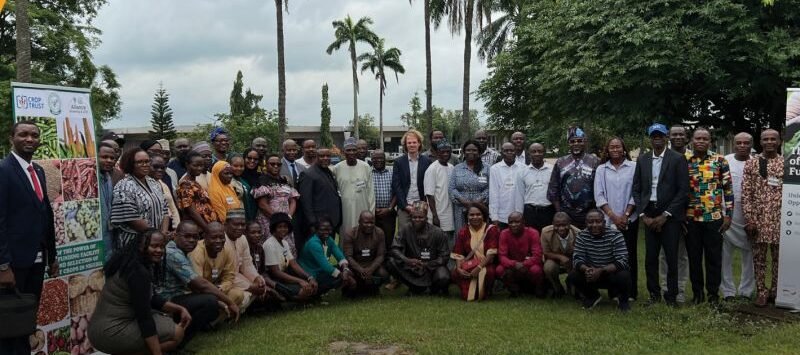Ibadan, Nigeria – 18 August 2025:
Farmers, breeders, researchers, food industry leaders, NGOs, and government officials convened in Ibadan to explore how Nigerian agriculture can respond to climate change, food insecurity, and shifting dietary demands. The two-day workshop centered on selecting “opportunity crops” — underutilized crops with untapped potential to boost nutrition, enhance resilience, and secure livelihoods.
Rising Challenges, Urgent Solutions
Nigeria’s population is projected to double by 2050, intensifying pressure on an already strained food system. Climate shocks—droughts, erratic rainfall, pests, and rising heat—are worsening production gaps, while urban consumers increasingly demand healthier and more diverse diets.
Against this backdrop, participants set out to identify crops that could reshape Nigerian agriculture.
A Collaborative Process
The workshop, organized by the Crop Trust’s Power of Diversity Funding Facility, in partnership with the Alliance of Bioversity International and CIAT and Nigeria’s National Centre for Genetic Resources and Biotechnology (NACGRAB), was hosted at the International Institute of Tropical Agriculture (IITA).
Guided by Dr. Gloria Otieno, participants assessed 37 crops against criteria such as climate resilience, nutritional value, marketability, and inclusivity of women and youth in farming. After robust debate, fonio and pigeon pea were selected as Nigeria’s leading “opportunity crops.”
Why Fonio?
Fonio, one of Africa’s oldest grains, is grown in Nigeria’s North and Plateau regions. Experts highlighted its nutritional profile, climate tolerance, and potential to reduce reliance on imported rice.
“Fonio grows more easily than rice, is protein-rich, and can save Nigeria billions in foreign exchange,” explained Anthony Ogunnupebi of the Justice Development and Peace Movement.
Challenges remain, as fonio is produced in small volumes and remains unfamiliar to many Nigerians. Yet with proper investment in awareness and processing, it could thrive locally and globally.
Why Pigeon Pea?
Pigeon pea, already present in Nigerian kitchens, stood out for its nutritional value, soil-enhancing qualities, and drought resistance.
“It is climate-smart and gender-inclusive across the value chain,” noted Mariam Abadaawud, a plant breeder.
Farmers praised pigeon pea’s versatility: eaten in traditional dishes, ground into flour, used medicinally, and even as animal feed. Dr. Dickson Nwosu of NACGRAB emphasized its resilience, recalling thriving crops even after five months without rain.
Reviving Forgotten Foods
For Nuhu Adamu Kilishi, Director of Nutrition and Food Safety at the Federal Ministry of Agriculture and Food Security, the workshop underscored the value of neglected foods:
“These are crops Nigeria once relied on but forgot. Reviving them will improve nutrition and resilience.”
A Global Effort
Fonio and pigeon pea now join a global initiative backed by Germany and Ireland through the Power of Diversity Funding Facility. Consultations have already taken place in Colombia, with more planned in Zambia, Kenya, and India. The goal: to conserve crop diversity in genebanks while building strong value chains that bring these climate-smart foods back to people’s plates.
“Opportunity crops can address multiple food system challenges,” said Nico Wilms-Posen, the program’s coordinator. “But they need coordinated investment to unlock their potential.”
Looking Ahead
The Ibadan workshop closed with optimism. Fonio and pigeon pea may not be a cure-all, but they symbolize a commitment to resilience, inclusion, and sustainability in Nigeria’s food future. By embracing forgotten crops, Nigeria contributes to a global movement reimagining how agricultural diversity can feed tomorrow’s world.


